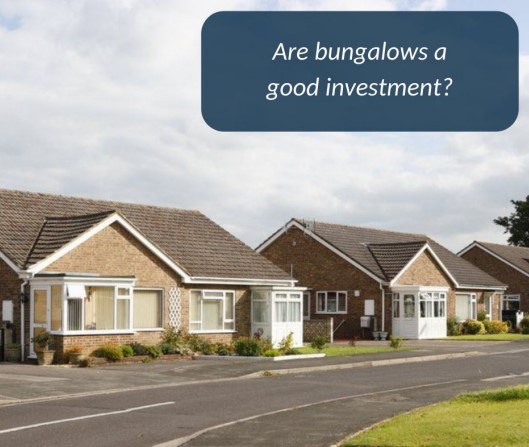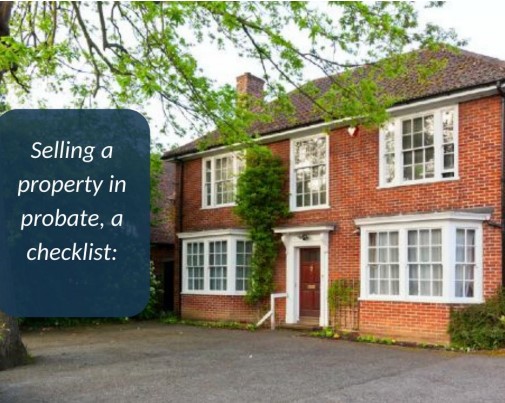Are Bungalows a Good Investment?
Are Bungalows a Good Investment?
The times of bungalows being purely for people who need easy access and no stairs have changed.
Of course, the immediate benefit of access and space are major reasons why bungalows are a good investment.
However, there are further great advantages about bungalows which suit property buyers of all ages. Single storey living may not work for everyone, but let’s address some questions about bungalows.
Should I buy a bungalow?
It is a common debate home buyers go through, on whether a house or bungalow is best for them. There are a variety of reasons you should consider both. Firstly, you need to assess whether a bungalow will work for you.
This means deciding what you need from your next property and what you want from it, too. Bungalows tend to be in quieter neighbourhoods. If you want or need, peace and quiet, a bungalow could be a great option.
However, if you need the separation from living and sleeping accommodation that an upstairs and downstairs provides, going for a bungalow may be a mistake.
Are bungalows a good investment?
Generally, bungalows make for a profitable investment.
Why is this?
Fewer bungalows are being built, this is for the simple reason developers do not see single storey properties as an effective use of land.
However, the demand for single-storey property from buyers remains. In the market, this means bungalows tend to hold their value and may experience faster growth than other types of property.
What to look for when thinking about buying a bungalow.
Unlike other types of property, there are a few things to look out for when thinking about buying a bungalow.
Getting a mortgage approved on a bungalow can be long drawn out and sometimes problematic if the building is built using ‘non-standard’ construction methods.
At your viewing of a bungalow, it is important to consider the following:
- The materials used to construct it
- The year it was built
- How much it has been standardised, by replacing non-standard materials with common ones
Some bungalows were built using prefabricated concrete frames and no cavity walls – these can be difficult to mortgage. These are known as Woolaway bungalows.
Another ‘non-standard’ construction method is building with timber frames; these are called Colt bungalows. Although these are not standard methods, it may be easier to get a mortgage on these than a Woolaway bungalow.
Are bungalows a good investment as a buy-to-let?
As demand is strong, bungalows can make a great option for buy-to-let investors. Trends show that renters too, have switched their demands more towards outdoor space in the wake of the Covid-19 pandemic. Large bungalows generally offer this in abundance.
As many bungalows are often on large plots, it means they have great potential to add value. Extensions are usually a great way to add square footage and, in the process, much more value.
The Benefits of Bungalows
Space, access and privacy
Bungalows tend to come with more space as most were built before 2000. After this time, developers turned to a trend of fitting lots more properties onto plots of land.
With larger plots of land, it means bungalows tend to have more space between properties and therefore, more privacy.
Large gardens are usually a feature of single-storey properties and as they are usually built with other bungalows, the nature of the property height means the gardens are less overlooked.
A great advantage is that a bungalow really can be a forever home, as being a single-storey means it will be suitable for you in later life as it is now.
Bungalows are great for kids
Stairs and young children do not generally mix well and if you have young kids, you will know that you only need to turn your back for a second for an accident to occur.
Having a bungalow means you can keep an eye on the little ones more easily, while the large gardens associated with them, are great for youngsters to explore and play safely at the same time.
Less Maintenance
After owning larger houses for many years, older people often choose bungalows because they demand less maintenance. In addition, vacuuming stairs may be arduous work, therefore the single-storey property is often favoured for older people.
Roofs and guttering are much lower on a bungalow, thus giving easier access than you would have with a house. Routine maintenance of a bungalow’s roof and guttering is much less daunting than compared to a larger house.
Scope to Extend and Modify
Open plan living has proved a popular trend and there are no signs of this being bucked.
If you own a bungalow, the style of interior design of open plan living is easier to achieve, than it would be with a two or three-storey house. This is because there are fewer supporting walls in a bungalow, this means achieving an open plan feel is much easier.
In addition, if you need more space, an extension into a large back garden to create a stunning open plan kitchen is usually straightforward. The large garden means there will be plenty of space left outside too.
Quiet Neighbours
The neighbourhoods where bungalows are tending to attract older property buyers, meaning they are quieter areas with less cars on the road, which also leads to fewer cars with more spaces to park and less noise. The space between properties also contributes to quietness, as does the fact that most bungalows are detached.
The Cons of Bungalows
High Demand, Low Supply
As bungalows are hugely popular, there is generally a high demand. Fewer bungalows are built, especially now with developers maximising land to develop, with less single-storey property being built.
Finding a bungalow that suits your needs can be a tough ask and even if you do uncover your dream one-storey home, you might end up paying a premium for it to fend off rival buy
Lack of Living / Sleeping Separation
There is less separation between the living area and bedrooms in a bungalow. If you have children trying to sleep you may find noise traveling through the house disturbs them. This can also be an issue if a family member wakes earlier than others.
Renovation Is Often Needed
Younger buyers may often find a lot of decoration and moderation is needed as the properties tend to be previously owned by older people. This does not always have to be perceived as a negative, of course, but it will mean that costs are incurred bringing a property up to scratch.
Security Worries
Let’s face it, most people like to sleep with a window open in the summer, but this can cause security worries for those living in bungalows due to sleeping on the ground floor.
Some people do not like sleeping on the ground floor full stop – and if you feel that way, a bungalow is almost certainly not the right option for you.
Houses Are Usually Better Value
As we have already established, a lack of supply compared with demand commands a premium for bungalows. This may mean you end up paying more per square foot than were you to buy a house.
With some bungalows, you could end up paying the same price as you would for a house, in terms of the plot of land it sits on, yet you will be receiving far less square footage for your money.







